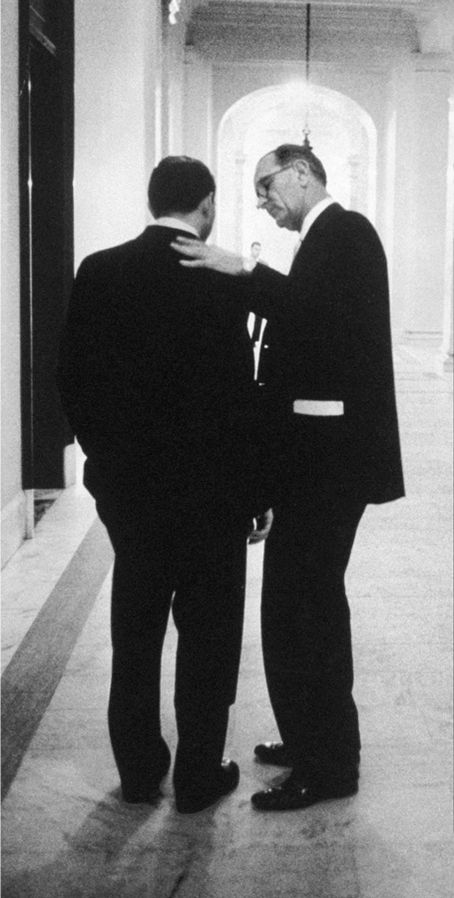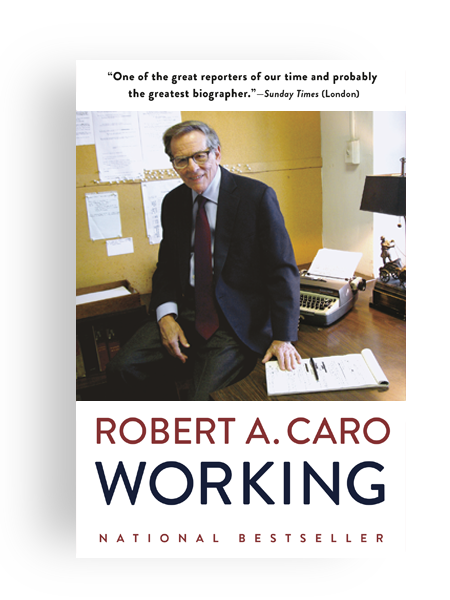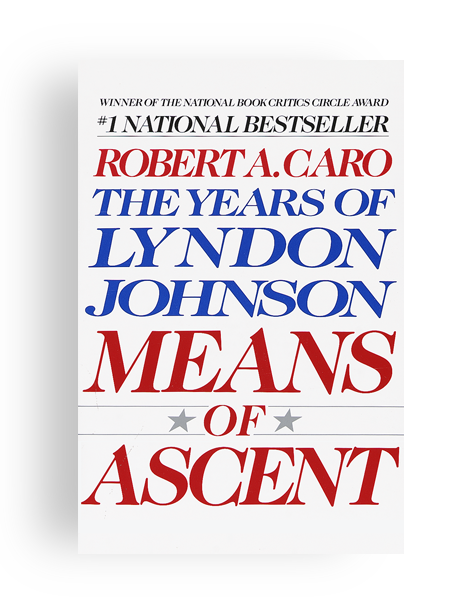THE YEARS OF LYNDON JOHNSON III
Master of the Senate
Master of the Senate carries Johnson’s story through one of its most remarkable periods: his twelve years, from 1949 to 1960, in the U.S. Senate. At the heart of the book is its unprecedented revelation of how legislative power works in America, how the Senate works, and how Johnson, in his ascent to the presidency, mastered the Senate as no political leader before him had ever done.
It was during these years that all Johnson’s experience—from his Texas Hill Country boyhood to his passionate representation in Congress of his hardscrabble constituents to his tireless construction of a political machine—came to fruition. Caro introduces the story with a dramatic account of the Senate itself: how Daniel Webster, Henry Clay, and John C. Calhoun had made it the center of governmental energy, the forum in which the great issues of the country were thrashed out. And how, by the time Johnson arrived, it had dwindled into a body that merely responded to executive initiatives, all but impervious to the forces of change. Caro anatomizes the genius for political strategy and tactics by which, in an institution that had made the seniority system all-powerful for a century and more, Johnson became Majority Leader after only a single term-the youngest and greatest Senate Leader in our history; how he manipulated the Senate’s hallowed rules and customs and the weaknesses and strengths of his colleagues to change the “unchangeable” Senate from a loose confederation of sovereign senators to a whirring legislative machine under his own iron-fisted control.
Caro demonstrates how Johnson’s political genius enabled him to reconcile the unreconcilable: to retain the support of the southerners who controlled the Senate while earning the trust—or at least the cooperation—of the liberals, led by Paul Douglas and Hubert Humphrey, without whom he could not achieve his goal of winning the presidency. He shows the dark side of Johnson’s ambition: how he proved his loyalty to the great oil barons who had financed his rise to power by ruthlessly destroying the career of the New Dealer who was in charge of regulating them, Federal Power Commission Chairman Leland Olds. And we watch him achieve the impossible: convincing southerners that although he was firmly in their camp as the anointed successor to their leader, Richard Russell, it was essential that they allow him to make some progress toward civil rights. In a breathtaking tour de force, Caro details Johnson’s amazing triumph in maneuvering to passage the first civil rights legislation since 1875.

Master of the Senate, told with an abundance of rich detail that could only have come from Caro’s peerless research, is both a galvanizing portrait of the man himself—the titan of Capital Hill, volcanic, mesmerizing—and a definitive and revelatory study of the workings and personal and legislative power.
PURCHASE THE BOOK
Winner of the Pulitzer Prize
Winner of the National Book Award
Winner of the Los Angeles Times Book Award
Praise for Master of the Senate
ANTHONY LEWIS, THE NEW YORK TIMES BOOK REVIEW
“A wonderful, a glorious tale. . . . It will be hard to equal this amazing book. It reads like a Trollope novel, but not even Trollope explored the ambitions and the gullibilities of men as deliciously as Robert Caro does. Even though I knew what the outcome of a particular episode would be, I followed Caro’s account of it with excitement. I went back over chapters to make sure I had not missed a word . . . Caro’s description of how [Johnson passed the civil rights legislation] is masterly; I was there and followed the course of the legislation closely, but I did not know the half of it.”
DANIEL FINKELSTEIN, THE TIMES (LONDON)
“A masterpiece . . . Robert Caro has written one of the truly great political biographies of the modern age.”
Tom & Mandy Levis
MALCOLM JONES, NEWSWEEK
“Mesmerizing. . . . [It] brings LBJ blazing into the Senate. . . . A tale rife with drama and hypnotic in the telling. The historian’s equivalent of a Mahler symphony.”
CHICAGO TRIBUNE
“Brilliant . . . Caro achieves a special tension, too rare in history books but essential in epic poetry: the drama of a hero who is wrestling with his enemies, his limitations and his fate to achieve something truly lasting . . . In his hands, the obscure fight over legislation becomes nothing less than a battle for the soul of America . . . It’s a terribly important work, unblinkingly delineating the inner workings of our democracy.”
DAN DELUCA, PHILADELPHIA INQUIRER
“An epic tale of winning and wielding power.”
RICHARD S. DUNHAM, BUSINESSWEEK
“Extraordinary. . . Caro must be America’s greatest living Presidential biographer . . . He entrances us with both his words and his research . . . No other contemporary biographer offers such a complex picture of the forces driving an American politician, or populates his work with such vividly drawn secondary characters.”
MICHAEL WOLFF, NEW YORK
“The most complete portrait of the Senate ever drawn.”
ARTHUR SCHLESINGER, JR
“In this fascinating book, Robert Caro does more than carry forward his epic life of Lyndon Johnson. With compelling narrative power and with remarkable subtlety and sensitivity, he illuminates the Senate of the United States and its byzantine power struggles. In this historical tour-de-force, Robert Caro shows himself the true ‘master of the Senate.’”
PATRICK BEACH, AUSTIN AMERICAN-STATESMAN
“Master of the Senate and its two preceding volumes are the highest expression of biography as art. After The Path to Power and Means of Ascent, there shouldn’t be much debate about Caro’s grand achievement, but let’s be clear about this nonetheless: In terms of political biography, not only does it not get better than this, it can’t.”
MOLLY IVINS, NEW YORK OBSERVER
“These [legislative battles] are great stories, the stuff of the legends of democracy—rich in character, plot, suspense, nuttiness, human frailty, maddening stupidity. These should be the American sagas; these should be our epics. Bob Caro has given us a beauty, and I think we owe him great thanks.”
ROBERT F. JULIAN, NEW YORK LAW JOURNAL
“Epic . . . It is impossible to imagine that a political science class on the U.S. Congress can be taught today that does not reference this book. It is a florid and graphic account of how Congress works, an authoritative work on the history of the Senate and a virtual cookbook of recipes for legislative success for the nascent politician.’
ERIC ALTERMAN, THE NATION
“Master of the Senate forces us not only to rewrite our national political history but to rethink it as well . . . Caro’s been burrowing beneath the shadows of the substance of our politics for more than twenty-eight years, and what he finds is both fascinating and surprising . . . Compulsively readable.”
ROBERT D. NOVAK, THE WEEKLY STANDARD
“A spectacular piece of historical biography, delicious reading for both political junkies and serious students of the political process…Fascinating.”
PAUL DUKE, BALTIMORE SUN
“Caro is a master of biography . . . With his Tolstoyian touch for storytelling and drama, Caro gives us a fascinating ride through the corridors of Senate sovereignty . . . Of all the many Johnson biographies, none approaches Caro’s work in painstaking thoroughness, meticulous detail and the capture of character . . . A dazzling tour de force that certifies Caro as the country’s preeminent specialist in examining political power and its uses.”
RON CHERNOW
“The richly cadenced prose is hypnotic, the research prodigious, the analysis acute, the mood spellbinding, and the cast of characters mythic in scale. I cannot conceive of a better book about Capitol Hill. An unforgettable, epic achievement in the art of biography.”
STEPHEN POLLARD, THE NEW STATESMAN
“It is, quite simply, the finest biography I have ever read. It is more than that: it is one of the finest works of literature I have encountered.”
PHILIP A. KLINKER, THE NATION
“Caro is a gifted and passionate writer, and his all-encompassing approach to understanding LBJ provides readers with a panoramic history of twentieth-century American politics as well as a compelling discourse on the nature and uses of political power…One of the best analyses of the legislative process ever written.”
JEAN STROUSE
“Vintage Caro—a portrait so deft, vivid, and compelling that you practically feel LBJ gripping your arm and bending you to his will.”
“I do understand power, whatever else may be said about me. I know where to look for it, and how to use it.”
—Lyndon Baines Johnson (from the epigraph to Master of the Senate)
During his years as majority leader in the U.S. Senate from 1955 through the end of 1960, Lyndon Johnson did something no one else had done: it was the only time since the days of Daniel Webster, Henry Clay, and John C. Calhoun, that the Senate worked in the way the Founding Fathers had intended—as its own center of governmental energy, creativity, and ingenuity.
THE YEARS OF LYNDON JOHNSON
Exploring Power
Below are selections from the Robert A. Caro Archive, Patricia D. Klingenstein Library, New-York Historical Society.
A page from Caro’s manuscript draft of Master of the Senate, circa 1990
Part of Caro’s self-discipline are two technological constraints: he drafts in longhand and then uses a Smith Corona electric typewriter to prepare final drafts. Both work to slow and measure the pace of composition.

Jackie Robinson with the Brooklyn Dodgers in 1954
“The great figure of my youth was Jackie Robinson,” says Robert Caro. “When you saw the bat held high and then whipping through the ball, when you saw the speed on the base paths, and when you saw the dignity with which Jack Roosevelt Robinson held himself in the face of the curses and the scorn and runners coming into second base with their spikes high, you had to think at least a little about America’s shattered promises.“ In Master of the Senate, Caro shows how his Brooklyn Dodger hero and black veterans helped break the dam that had blocked the rising tide of civil rights legislation.


Webster Replying to Hayne by George P.A. Healy, January 1830
Caro introduces Master of the Senate by examining the Golden Age of the Senate—the time of Webster, Clay, and Calhoun—when, as Alexis de Tocqueville wrote, it was “composed of eloquent advocates, distinguished generals, wise magistrates, and statesmen of note, whose arguments would do honor to the most remarkable parliamentary debates of Europe.”

Lyndon Johnson with Hubert H. Humphrey and Richard B. Russell
The liberals in the Democratic cloakroom—the majority cloakroom; there were forty-nine Democratic senators in 1957 and forty-seven Republicans—included some of the great figures of the fight for social justice in America in the middle of the twentieth century. Among them was Hubert Horatio Humphrey of Minnesota, who as a crusading young mayor had courageously fought not only underworld gambling interests but the racial and religious bias that had made Minneapolis “the anti-Semitism capital of America.“
A Second Pulitzer
Columbia University President Lee C. Bollinger (left) presents Robert A. Caro with the 2003 Pulitzer Prize in Biography for Master of the Senate.


Abraham Lincoln struck off the chains of black Americans, but it was Lyndon Johnson who led them into voting booths, closed democracy’s sacred curtain behind them, placed their hands upon the lever that gave them a hold on their own destiny, made them, at last and forever, a true part of American political life. His great voting rights legislation, the supreme accomplishment of his life and his career would be passed during his presidency, of course; it was then that he most firmly took the hands of black Americans. But he first reached for their hands not as President, but in the Senate.
FROM MASTER OF THE SENATE
Robert Caro Books
He has measurably enriched our lives with his intellectual rigor, his compassion, his openness, his wit and grace.
SIR HAROLD EVANS, THE NEW YORK TIMES










